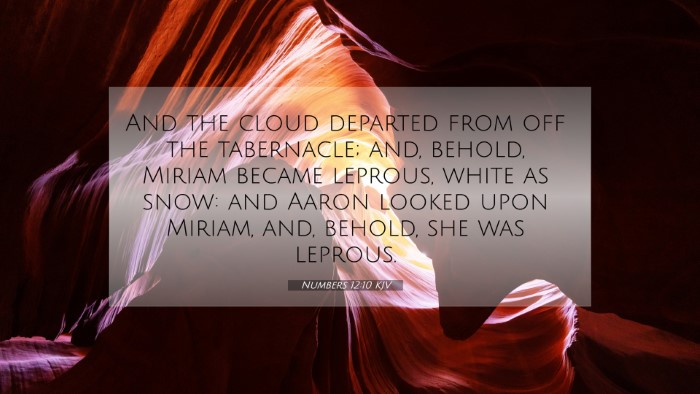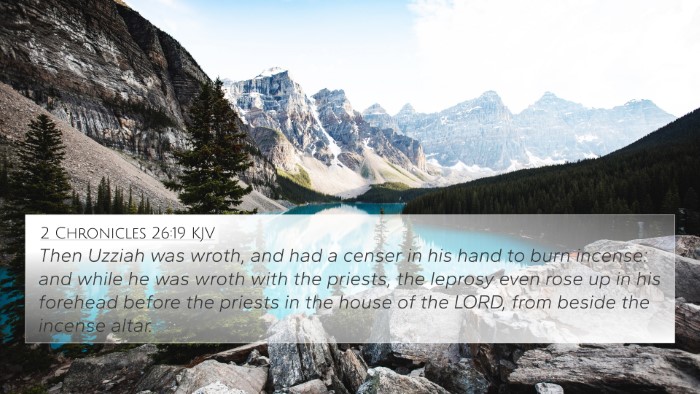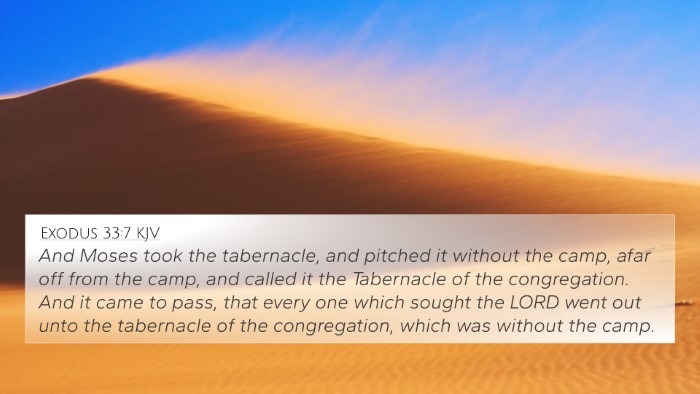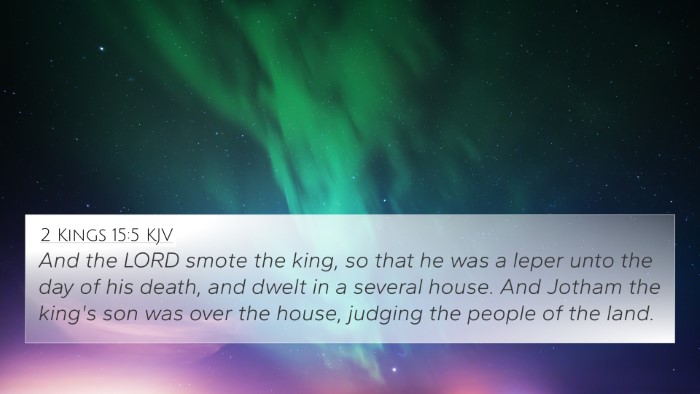Understanding Numbers 12:10
Verse: Numbers 12:10 - "And the cloud departed from off the tabernacle; and, behold, Miriam became leprous, white as snow: and Aaron looked upon Miriam, and, behold, she was leprous."
Summary of the Verse Meaning
This verse recounts a pivotal moment in the narrative of Moses, Miriam, and Aaron. Here, God’s judgment manifests upon Miriam after she and Aaron criticize Moses. The sudden affliction of leprosy serves both as a judgment for their rebellion and a lesson on the sanctity of God's chosen leaders.
Commentary Insights
Matthew Henry: Matthew Henry emphasizes the seriousness of speaking against God’s appointed prophet. He views Moses as a type of Christ, which highlights the grave consequences of blaspheming those who represent divine authority. Henry notes that this incident serves as a reminder of God’s holiness and the need for respect toward His chosen servants.
Albert Barnes: Albert Barnes points out that this event highlights the consequences of pride and envy. He explains that Miriam's leprosy symbolizes purity and the cleansing that often follows God’s judgment. Barnes draws a parallel between this incident and the persistent theme throughout scripture concerning the importance of humility before God and His anointed leaders.
Adam Clarke: Adam Clarke elaborates on the nature of Miriam's punishment, interpreting it as a means of divine correction. Clarke stresses that Miriam’s position as a leader does not exempt her from accountability. He explains that her outward affliction serves as a visible representation of her inner spiritual state after her rebellion against Moses.
Bible Verse Cross-References
- Exodus 4:10-12: God reassures Moses of his speaking impediment, demonstrating God’s authority over human limitations.
- James 3:1-2: Warns teachers of stricter judgment, linking to the responsibility of leaders in spiritual matters.
- Matthew 7:1-2: Jesus’ teaching on judgment highlights the principle that the measure you use will be measured against you.
- 1 Corinthians 10:10: Paul cites the example of the Israelites’ complaints to encourage unity and humility.
- Hebrews 12:15: A call to guard against bitterness, akin to the envy that led Miriam and Aaron to speak against Moses.
- Romans 14:10: Encourages believers to refrain from judging one another, parallel to Miriam and Aaron’s judgment of Moses.
- Galatians 6:7: Explains that we reap what we sow, emphasizing the consequence of actions taken against God’s appointed leaders.
- Numbers 20:10-12: Highlights another instance of God’s judgment, reinforcing the accountability of His appointed leaders.
- Matthew 18:6: Warns against offending one of the little ones in faith, akin to the respect owed to God's prophets.
- Psalm 105:15: Affirms that God does not tolerate harm to His anointed ones, signifying divine protection over His chosen leaders.
Thematic Connections
The theme of divine correction is evident in both the Old and New Testaments. This incident underscores God’s desire for order and respect within the community of believers. The narrative serves as a warning to all regarding the dangers of pride and the importance of honoring those whom God has placed in authority.
Tools and Resources for Cross-Referencing
- Bible Concordance: A useful tool to locate terms and themes corresponding to specific scriptures.
- Bible Cross-Reference Guide: Offers insights into connected verses for deeper understanding.
- Cross-reference Bible Study: Methodologies for engaging with scripture contextually and thematically.
- Bible Chain References: A systematic approach to tracing themes through interconnected scriptures.
- Comprehensive Bible Cross-reference Materials: Resources available in print and online to assist in thorough biblical study.
Conclusion
Numbers 12:10 serves as a powerful lesson on respect for God’s leaders and the repercussions of speaking against divine authority. The combined insights from ancient commentators such as Matthew Henry, Albert Barnes, and Adam Clarke reflect the necessity for humility and the serious nature of leadership within the church community. By exploring cross-references, readers can gain a fuller understanding of the themes present in scripture and their applications to contemporary faith practices.













